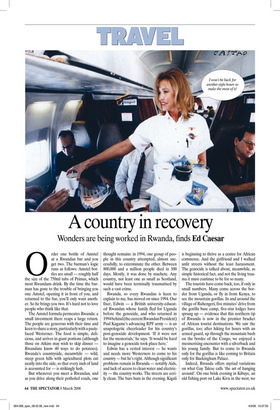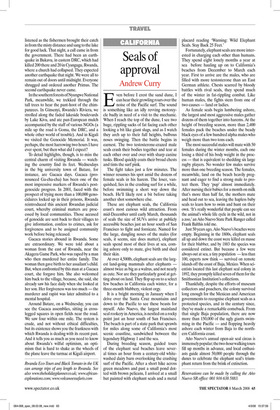A country in recovery
Wonders are being worked in Rwanda, finds Ed Caesar Order one bottle of Amstel at a Rwandan bar and you get two. The barman’s logic runs as follows: Amstel bottles are small — roughly half the size of the 750ml tubs of Primus, which most Rwandans drink. By the time the barman has gone to the trouble of bringing you one Amstel, opening it in front of you, and returned to the bar, you’ll only want another. So he brings you two. It’s hard not to love people who think like that.
The Amstel formula permeates Rwanda: a small investment there reaps a large return. The people are generous with their time and keen to share a story, particularly with a pastyfaced Westerner. The food is simple, delicious, and arrives in giant portions (although those on Atkins may wish to skip dinner — Rwandans know 40 ways to do potatoes). Rwanda’s countryside, meanwhile — wild, steep green hills with agricultural plots cut neatly into the side, so that every inch of land is accounted for — is strikingly lush.
But whenever you meet a Rwandan, and as you drive along their potholed roads, one thought remains: in 1994, one group of people in this country attempted, almost successfully, to exterminate the other. Between 800,000 and a million people died in 100 days. Mostly, it was done by machete. Any country, not least one as small as Scotland, would have been terminally traumatised by such a vast crime.
Rwanda, so every Rwandan is keen to explain to me, has moved on since 1994. Our fixer, Edwin — a British university-educated Rwandan whose family fled for Uganda before the genocide, and who returned in 1994 behind (the current Rwandan President) Paul Kagame’s advancing RPF army — is an unapologetic cheerleader for his country’s post-genocide development. ‘If it were not for the memorials,’ he says. ‘It would be hard to imagine a genocide took place here.’ Edwin has a vested interest — he wants and needs more Westerners to come to his country — but he’s right. Although significant problems remain in Rwanda — notably Aids, and lack of access to clean water and electricity — the country works. The streets are eerily clean. The bars hum in the evening. Kigali is beginning to thrive as a centre for African commerce. And the girlfriend and I walked unlit streets without the least harassment. The genocide is talked about, meanwhile, as simple historical fact, and not the living trauma it must continue to be for so many.
The tourists have come back, too, if only in small numbers. Many come across the border from Uganda, or fly in from Kenya, to see the mountain gorillas. In and around the village of Ruhengeri, five minutes’ drive from the gorilla base camp, five-star lodges have sprung up — evidence that this northern tip of Rwanda is now in the premier bracket of African tourist destinations. We saw the gorillas, too; after hiking for hours with an armed guard, up through the mountain bush on the border of the Congo, we enjoyed a mesmerising encounter with a silverback and his young family. But to come to Rwanda only for the gorillas is like coming to Britain only for Buckingham Palace.
Indeed, Rwanda offers myriad variations on what Gay Talese calls ‘the art of hanging around’. On one brisk evening in Kibuye, an old fishing port on Lake Kivu in the west, we listened as the fishermen brought their catch in from the misty distance and sang to the lake for good luck. That night, a call came in from the government. There had been an earthquake in Bukavu, in eastern DRC, which had killed 200 there and 20 in Cyangugu, Rwanda, where a church had collapsed. They expected another earthquake that night. We were all to remain out of doors until midnight. Everyone shrugged and ordered another Primus. The second earthquake never came.
In the southern forests of Nyungwe National Park, meanwhile, we trekked through the tall trees to hear the pant-hoot of the chimpanzees. In Ginsenyi, Rwanda’s Riviera, we strolled along the faded lakeside boulevards by Lake Kivu, and ate pan-European mulch accompanied by the staff of various NGOs (a mile up the road is Goma, the DRC, and a whole other world of trouble). And in Kigali we visited the Genocide Memorial. It was, perhaps, the most harrowing two hours I have ever spent, but then what did I expect?
To detail highlights, though, is to miss the central charm of visiting Rwanda — watching the country find its feet. Wednesdays in the big university town of Butare, for instance, are Gacaca days. Gacaca (pronounced Ga-cha-cha) has been one of the most impressive markers of Rwanda’s postgenocide progress. In 2001, faced with the prospect of trying more than a 100,000 genocidaires locked up in their prisons, Rwanda reintroduced this ancient Rwandan judicial court, whereby criminal matters are processed by local communities. Those accused of genocide are sent back to their villages to give information, confess to crimes, ask for forgiveness and to be assigned community work before being released.
Gacaca stories abound in Rwanda. Some are extraordinary. We were told about a woman from the east of Rwanda, near the Akagera Game Park, who was raped by a man who then murdered her entire family. The woman then gave birth to her assailant’s child. But, when confronted by this man at a Gacaca court, she forgave him. She also welcomed him back to the village, because, she said, she already saw his face daily when she looked at her son. Her forgiveness was too much — the murderer and rapist was later admitted to a mental hospital.
Around Butare, on a Wednesday, you can see the Gacaca assemblies, sitting in crosslegged squares in open fields near the road. We saw four within one mile. The system is crude, and not without ethical difficulties, but its existence shows you the frankness with which Rwanda is dealing with its recent past. And it tells you as much as you need to know about Rwanda’s wilful optimism, an optimism that is hard to shake as the wheels of the plane leave the tarmac at Kigali airport.
Rwanda Eco-Tours and Black Tomato in the UK can arrange trips of any length to Rwanda. See also www.theholidayplanner.co.uk; www.africanexplorations.com; www.volcanoessafaris.com



















































































 Previous page
Previous page